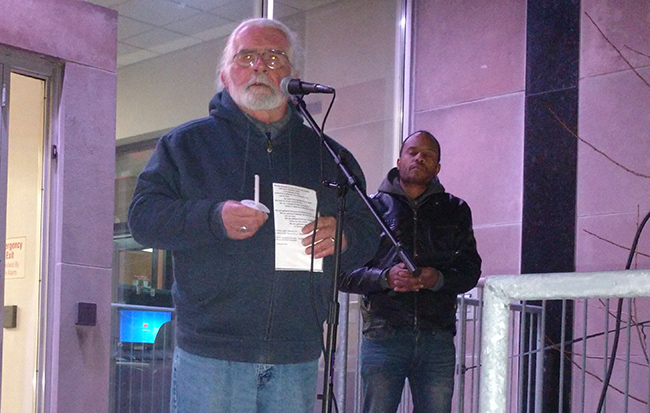Vigil honours Colten Boushie

By Colin Graf
SARNIA – Residents of Sarnia and the neighbouring Aamjiwnaang First Nation came together last on Feb. 22 for a reconciliation vigil in honour of Colten Boushie and to promote solidarity between the groups.
The event, attended by around 40 people, was held not as a protest, but to “remain watchful and awake to the events of the day, and to recognize a need, now more than ever, for healing,” said United Church Rev. Adam Kilner told the group from the steps of Sarnia’s City Hall.
The vigil was arranged to give people a chance to come together in the spirit of love and peace and recognize the need for change in Canada, Kilner said. “We cannot bring him (Colten Boushie) back, nor lessen the sorrow of his family and his community, but we here in Sarnia we can forge bonds of love with the First Peoples of this land here today,” he said.
Elder Geraldine Robertson of the Aamjiwnaang First Nation, recipient of the Order of Ontario, said she is “dismayed” by the outcome of the Boushie case, and hopes for change. “It gives you more determination to work toward reconciliation. We know there are major problems here, but we can work to resolve them. It’s the only way we can go forward. We deserve to be proud Canadians, every one of us,” she told the group.
Robertson will be receiving the Order of Ontario on Feb. 27 in Toronto, in recognition of two decades teaching and promoting awareness of abuse suffered by First Nations in residential schools, encouraging other residential school survivors to talk about their experiences, educating people on the intergenerational effects of the schools, and helping advocate for compensation.
Sarnia Mayor Mike Bradley spoke of his frustration with the lack of progress in relationships between First Nations and senior governments in Canada. “I have lived with 30 years of rhetoric without real change and I am hoping what’s happened in the last two weeks will galvanize people,” he said. “Each of us will take this message back; it’s time to move on and do real things to change the relationship.”
While “Canadians don’t like to talk about this,” the country faces “many of the same issues” with race relations as the U.S.A. did in past decades, Bradley said.
That message was echoed by Kilner, who helped organize the vigil. He told Anishinabek News in an interview he was not surprised by the not guilty verdict in the Boushie shooting. “I struggle to see difference between things like that and the stuff that happened in Ferguson, Missouri,” with rioting over police brutality in the U.S. “We Canadians don’t like to think of ourselves that way, we like to think of ourselves as more polite and sophisticated, but sometimes you just break things down that way.” he said.
Rev. Matthew Stevens, describing himself as Metis and Anishinabe, called on people at the vigil to “try and find ways we can set aside all the wrongs of the past” and “in a genuine and sincere way work together to work out our differences and spread justice among all of us. Then Colten Boushie will have passed for a reason, and we’ll be able to look back and say that’s the day things started to change,” said Stevens, of Sarnia’s St. Paul’s United Church.
Kilner was pleased with the message that went out at the vigil. “We wanted to do our part in acknowledging that people are hurting and that a new day has to come. I would hope we would do stuff like this for any kind of painful issue for any race of people, but this kind of thing seems to happen over and over again” with First Nations, he said.


